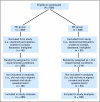Attitudes toward information about genetic risk for cognitive impairment after cancer chemotherapy: breast cancer survivors compared with healthy controls
- PMID: 20498392
- PMCID: PMC2917210
- DOI: 10.1200/JCO.2009.27.8267
Attitudes toward information about genetic risk for cognitive impairment after cancer chemotherapy: breast cancer survivors compared with healthy controls
Abstract
Purpose: The trend toward personalized medicine will involve cancer treatment increasingly being tailored to the genetic characteristics of individuals. However, the availability of genetic information does not imply this information is desired or would impact treatment decision making.
Methods: One hundred sixty breast cancer survivors (BC group) and 205 healthy controls (HC group) were randomly assigned to respond to two different clinical scenarios varying in genetic-related risk of cognitive impairment (CI; little v very likely) and severity of CI (little v moderate problem) after chemotherapy. Ratings of the importance of being told this genetic information (information importance) and the likelihood this information would affect their decision to receive chemotherapy (information impact) were obtained.
Results: Results indicated the importance ascribed to genetic information was greatest when CI likelihood and severity were both high or low (P < .05). Information impact ratings were not sensitive to differences in CI likelihood or severity; the BC group was less likely to indicate genetic information would affect their decision to receive chemotherapy than the HC group (P < .001).
Conclusion: Results suggest lessened enthusiasm for genetic information that maintains or increases uncertainty about a specific course of action and highlight the importance of including clinically relevant groups in treatment decision-making research that employs hypothetical scenarios. Although women generally believe it is important to receive genetic information, they might benefit from assistance (eg, decision aid) in the difficult task of integrating information about survival and risk for adverse late effects from cancer treatment.
Conflict of interest statement
Authors' disclosures of potential conflicts of interest and author contributions are found at the end of this article.
Figures
Similar articles
-
Dissociation of decision making under ambiguity and decision making under risk in breast cancer patients receiving adjuvant chemotherapy: a neuropsychological study.Brain Res. 2013 Oct 2;1533:63-72. doi: 10.1016/j.brainres.2013.08.015. Epub 2013 Aug 14. Brain Res. 2013. PMID: 23954744
-
Cognitive deficits in Korean women treated with chemotherapy for breast cancer.Cancer Nurs. 2014 May-Jun;37(3):E31-42. doi: 10.1097/NCC.0b013e3182980383. Cancer Nurs. 2014. PMID: 23945143
-
Cognitive and emotional factors predicting decisional conflict among high-risk breast cancer survivors who receive uninformative BRCA1/2 results.Health Psychol. 2009 Sep;28(5):569-578. doi: 10.1037/a0015205. Health Psychol. 2009. PMID: 19751083 Free PMC article.
-
Cognitive impairment in breast cancer survivors treated with chemotherapy depends on control group type and cognitive domains assessed: A multilevel meta-analysis.Neurosci Biobehav Rev. 2017 Dec;83:417-428. doi: 10.1016/j.neubiorev.2017.10.028. Epub 2017 Oct 29. Neurosci Biobehav Rev. 2017. PMID: 29092778 Review.
-
Chemotherapy-induced cognitive impairment in women with breast cancer: a critique of the literature.Oncol Nurs Forum. 2005 Mar 5;32(2):329-42. doi: 10.1188/05.ONF.329-342. Oncol Nurs Forum. 2005. PMID: 15759070 Review.
Cited by
-
Depression involved in self-reported prospective memory problems in survivors of breast cancer who have received chemotherapy.Medicine (Baltimore). 2019 Apr;98(16):e15301. doi: 10.1097/MD.0000000000015301. Medicine (Baltimore). 2019. PMID: 31008981 Free PMC article.
-
Testing personalized medicine: patient and physician expectations of next-generation genomic sequencing in late-stage cancer care.Eur J Hum Genet. 2014 Mar;22(3):391-5. doi: 10.1038/ejhg.2013.158. Epub 2013 Jul 17. Eur J Hum Genet. 2014. PMID: 23860039 Free PMC article.
-
Exploring Prostate Cancer Patients' Interest and Preferences for Receiving Genetic Risk Information About Cancer Aggressiveness.Am J Mens Health. 2020 May-Jun;14(3):1557988320919626. doi: 10.1177/1557988320919626. Am J Mens Health. 2020. PMID: 32436757 Free PMC article.
-
A closer look at unmet needs at the end of primary treatment for breast cancer: a longitudinal pilot study.Behav Med. 2015;41(2):69-76. doi: 10.1080/08964289.2014.889068. Epub 2014 Sep 15. Behav Med. 2015. PMID: 24512316 Free PMC article.
-
Moderating Effects of Genetic Polymorphisms on Improvements in Cognitive Impairment in Breast Cancer Survivors Participating in a 6-Week Mindfulness-Based Stress Reduction Program.Biol Res Nurs. 2015 Jul;17(4):393-404. doi: 10.1177/1099800415577633. Epub 2015 Apr 15. Biol Res Nurs. 2015. PMID: 25882604 Free PMC article. Clinical Trial.
References
-
- Guttmacher AE, Collins FS. Genomic medicine: A primer. N Engl J Med. 2002;347:1512–1520. - PubMed
-
- Khoury MJ, McCabe LL, McCabe ER. Population screening in the age of genomic medicine. N Engl J Med. 2003;348:50–58. - PubMed
-
- Blackwood MA, Weber BL. BRCA1 and BRCA2: From molecular genetics to clinical medicine. J Clin Oncol. 1998;16:1969–1977. - PubMed
-
- Fasouliotis SJ, Schenker JG. BRCA1 and BRCA2 gene mutations: Decision making dilemmas concerning testing and management. Obstet Gynecol Surv. 2000;55:373–384. - PubMed
-
- Nathanson KL, Wooster R, Weber BL. Breast cancer genetics: What we know and what we need. Nat Med. 2001;7:552–556. - PubMed
Publication types
MeSH terms
Grants and funding
LinkOut - more resources
Full Text Sources
Medical



